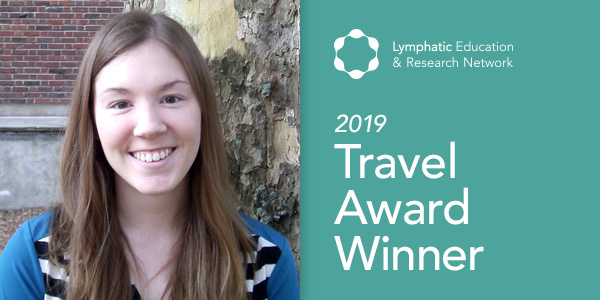Lauren Sestito, currently a Ph.D. candidate in Biomedical Engineering at Georgia Institute of Technology in Atlanta, GA, under the supervision of Dr. Susan Thomas, received a Travel Award from LE&RN to attend the Lymphatic Forum in Austin, TX. We asked Lauren to share her thoughts on that experience with us and to tell us a bit about her research and future plans.
What did you get out of the Lymphatic Forum? Why did you feel it was important to attend?
The Lymphatic Forum was an incredible experience, and I am grateful to LE&RN for giving me the opportunity to attend. I was able to spend three days immersed in lymphatic science, listening to talks on cutting-edge research, and meeting experts in the field. I had the opportunity to present my own work as a NanoTalk and poster, which led to productive discussion, feedback, and the opportunity to initiate new productive collaborations. The Lymphatic Forum also had a significant clinical component, which was interesting to me as a scientist; hearing from patients and clinicians about the importance of our work and the challenges they face every day was eye-opening and inspirational.
What are your areas of interest in research?
My work focuses on lymphatic-targeted drug delivery, employing nanoparticles to deliver small molecules that are otherwise poorly taken up into lymphatics. We have developed a nanoparticle system for the delivery of nitric oxide, and have shown successful delivery of nitric oxide to lymph nodes draining a forelimb injection. Systems like these for the delivery of nitric oxide and other small molecules have the potential for therapeutic use in a wide variety of lymphatic-related diseases, including lymphedema and cancer.
What are your hopes and plans for your career and your research?
Through the completion of my Ph.D., I hope to reveal practical and therapeutic applications for small molecule drug delivery to lymphatic vessels and lymph nodes. Long-term, my career goal is to become an independent researcher and to help teach and inspire the next generation of lymphatic researchers.
Why do you believe that, in general, lymphatic research is important? What might the field accomplish within the next few years?
The lymphatics play a critical role in fluid balance and in the immune response, enabling the rapid transport of fluid, antigen, and immune cells to lymph node immune cells. The lymphatics are present in almost every organ system and are thus important in a huge variety of diseases, from obvious roles in lymphedema, cancer, and primary lymphatic disease to more subtle roles in metabolic diseases and atherosclerosis or other cardiovascular diseases. Understanding lymphatic function and the role of this unique system will uncover new therapeutic approaches for the treatment of challenging diseases.
LE&RN programs, like LE&RN Travel Awards, are only possible because of our Partners and Supporting Members. Become a Supporting Member today.

